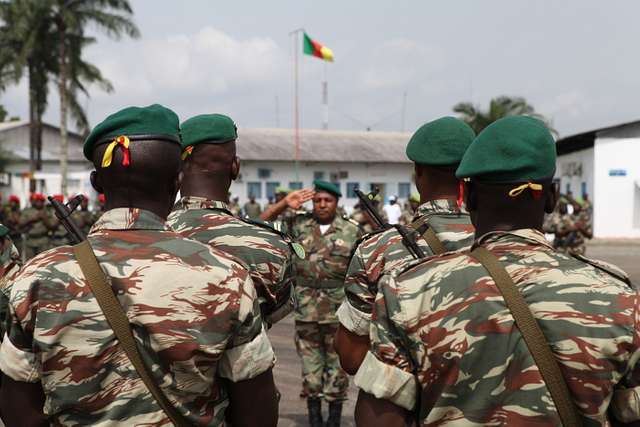Cameroon is composed of an 80% French-speaking majority and 20% English-speaking minority concentrated in the Northwest and Southwest regions, the former British Southern Cameroons. Since 2016, an unprecedented violent conflict has been ongoing in the Anglophone regions. This emerged when peaceful protests by lawyers and teachers against the francophonisation of the distinctive anglophone legal and educational systems were violently repressed by the government. The Cameroon Anglophone Civil Society Consortium (CACSC) then initiated ‘Operation Ghost Towns Resistance’ with weekly shutdown of schools and businesses in the anglophone regions and called for two-state federalism. The government responded in January 2017 by banning CACSC and arresting its leaders on treason and terrorism charges and imposing a three-month internet blackout. Such state repression led to separatist voices taking centre-stage and the emergence of armed groups. The unilateral declaration of the Republic of Ambazonia on 1 October 2017 was supported by mass demonstrations, with at least 17 people killed by security forces. Subsequent clashes between the military and armed separatist groups have been ongoing. The conflict has resulted in hundreds of villages razed, over 6,000 people killed, 1.1 million people displaced, 2.2 million in need of humanitarian assistance, and approximately 700,000 children suffering educational disruption.
The roots of the conflict can be traced to Cameroon’s colonial origins and a divisive post-colonial political landscape. The latter include the abolition of the 1961 reunification federal constitution by President Ahidjo in 1972 and President Biya’s 1984 Decree renaming the country as ‘La Republique du Cameroun’, the name adopted by French Cameroon at its independence in 1960. Anglophone voices that challenged these unlawful changes in earlier decades were quelled by government forces. While political liberalisation in the early 1990s enabled civil society groups to emerge, civic space quickly shrunk again with violent clashes with the army in 1991, which has continued to this day.
International responses to the current conflict have been very limited, with little pressure from Western governments and no intervention from the AU or UN. A Swiss government peace initiative collapsed in September 2022 when Biya’s government reportedly withdrew. The only internal dialogue initiated by the government, the ‘Major National Dialogue’ in 2019, limited the participation and voices of civil society organizations (CSOs) and other key stakeholders. Given the failure of top-down interventions, our research interrogated the following: What contributions have CSOs made to seeking conflict resolution and peace? How have their efforts been constrained by shrinking civic space? What strategies are used by CSOs to overcome such constraints?
Findings reveal that CSOs contribute significantly to conflict resolution efforts. They provide humanitarian relief; trauma healing; organise peace campaigns and peace education; and document human rights violations. Humanitarian relief is of critical importance as it enables affected communities and vulnerable groups to meet their basic needs while demonstrating solidarity and CSO legitimacy within local communities. Further, using homegrown non-violent resistance such as the ‘lamentation campaign’ (mourning as a form of protest), CSOs have brought attention to the plight of local populations, while urging warring parties to the negotiation table.
However, CSOs’ efforts are hampered by the shrinking of civic space by the authorities, inclusive of ‘legal’ and ‘repressive’ measures. Participants underscored that in addition to the banning and arrests of the Consortium and its leaders, regular government administrative controls deny many CSOs from accessing affected communities. CSOs are also subjected to intimidation and violence from the warring factions including office break-ins and kidnappings. Understandably, many CSOs are afraid to openly share their views or advocate for a political solution to the conflict
To navigate these constraints, CSOs use diverse strategies such as awareness-raising activities, community dialogue, coalition-building, and documenting, verifying, and disseminating information. The Southwest Northwest Women’s Taskforce is a successful example of an organization using these tools to enhance collective action toward peace. CSOs use some strategies as ‘created spaces’ to build critical consciousness around peacebuilding issues. Nonetheless, operating in such a constrained space, CSO initiatives for peace can only go so far, and therefore their influence on conflict resolution remains limited. This supports arguments that in conflict-affected societies, peacebuilding from below alone may not suffice, and additionally requires leverage with and by national and international efforts.

Prospects for peace in the Cameroon Anglophone Conflict remain elusive after six years of conflict. The Cameroon government remains intent on a military solution to a political problem, while armed separatist groups have become entrenched in long-term conflict. CSOs have advocated for peace in imaginative ways yet are unable to propose a political solution that addresses the root causes of the conflict, knowing that this would bring down the repressive force of the state upon themselves.
Featured images: Protests ; Military (Austin Berner, Picryl)






